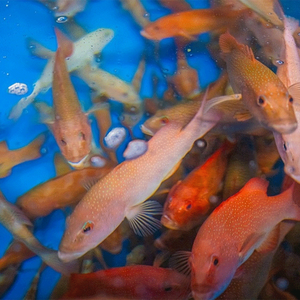A recently published study conducted by Spring Genetics Tilapia in Miami, Aker BioMarine Antarctic AS, and LABOMAR (the Marine Sciences Institute in NE Brazil) evaluated whether krill meal in the diet impacted the reproductive performance of Nile tilapia and the quality and quantity of offspring. Scientists specifically assessed how varying levels of krill meal in the Nile tilapia diet influenced factors such as spawning, egg quantity and quality, and survival of larvae.
“Through previous studies, we have learned that lipids and essential fatty acids can have a positive effect on the reproductive performance of fish. Traditionally, farmers have included fishmeal and fish oil in the feed to meet these needs, but due to growing scarcity and fluctuating costs, more sustainable and effective ingredients are needed, and here krill meal could be a part of the solution to fill the gap,” said Kiranpreet Kaur, director R&D, Fish Health & Nutrition, Aker BioMarine.
The 12-week feeding trial was run at a tilapia breeding facility in Miami, Florida. The 792 tilapia broodstock were divided into 12 cages, each with a 3:1 female-to-male ratio. The fish were fed twice daily, receiving one of the three test feeds: krill meal inclusion of 2%, krill meal inclusion of 5%, or a control diet mimicking commercial Nile tilapia broodstock feed.
“As the local partner and facilitator for this study, specializing in Nile tilapia breeding, we continually seek innovative ways to improve growth, survival, and overall yield. It’s important for us to partner with other stakeholders, like Aker BioMarine, to run trials like this one and learn more about promising ingredients such as krill meal and how it can help us improve broodstock performance,” says Hideyoshi Segovia Uno, CEO & co-Owner, Spring Genetics.
“As we investigated the effects of krill meal on the reproductive performance of Nile tilapia broodstock, we observed significant positive effects. In summary, we saw higher egg production, increased spawning frequency, and improved larval survival compared to the control diet – results that are line with previous studies on krill meal in the broodstock marine fish diet. This study serves to shed more light on the relationship between nutrition and reproduction, as well as overall broodstock performance. It underscores the potential for enhancing tilapia reproductive performance,” said Alberto Nunes of Labomar and first author of this study.
A look at the detailed results
Overall egg production
- Nile tilapia fed 2% krill meal diet achieved 18% higher egg production than the control group.
- Nile tilapia fed 5% krill meal diet achieved 30% higher egg production than the control group.
Spawning
- Nile tilapia fed 2% krill meal had 14% more spawning females than the control group.
- Nile tilapia fed 5% krill meal had 29% more spawning females than the control group.
- Most females spawned twice when receiving krill meal in the diet in comparison to control fish that mostly spawned once during the trial.
Larval survival
The 5% krill meal diet had a positive effect on total number of larvae on day 10 after hatching, 10% higher than the control group.
Egg composition
- The Nile tilapia eggs contained higher fat content when fish were fed krill meal.
- n-3 fatty acid levels, with EPA and DHA, were higher in the 5% krill meal group versus the control group.
“Overall, this study suggests the positive effects on reproductive performance and larval survival in Nile tilapia when krill meal is included in the diet,” added Kaur. “These results are a strong indication that krill meal is a viable and nutrient-rich marine ingredient for the broodstock Nile tilapia diet. We look forward to further research to learn more.”
Reference:
Nunes, A. J. P., Segovia, H., Raymo, G. O., Leonardi, G., & Kaur, K. (2024). Effect of krill meal on the reproductive performance of broodstock Nile tilapia, Oreochromis niloticus. Journal of Applied Aquaculture, 1–12. https://doi.org/10.1080/10454438.2024.2319646













